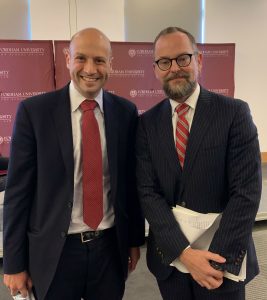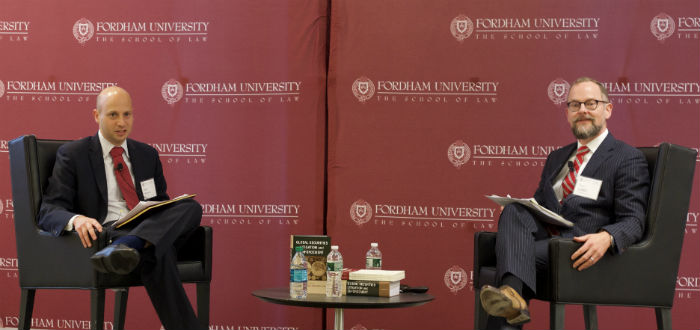On Friday, October 18, 2019 SEC Commissioner Elad L. Roisman sat down with Professor Sean J. Griffith, TJ Maloney Chair in Business Law, for a conversation about mutual fund investors, proxy voting, and sticky default rules. The fireside chat capped the Fordham Journal of Corporate and Financial Law’s symposium entitled Global Investor Protection: Securities Law Enforcement Around the World.
Griffith began by asking Roisman to discuss the SEC’s release of guidance from August of this year clarifying proxy voting responsibilities for investment advisers. Voting is a crucial aspect of investing, and the new guidance allows advisers and their investors to establish their own unique voting rules concerning shares held by the fund.
“If you are an investment adviser, you have the ability to scope your relationship to include or exclude voting, and if you choose to include voting, you have a fiduciary duty to vote responsibly and in the best interest of the client,” Roisman explained.
 There are two aspects to fiduciary duty, he elaborated. Duty of care is a commitment to establishing reasonable methods to ensure the adviser acts in the client’s best interest, while duty of loyalty obliges the investment adviser to never put their interests ahead of their client’s.
There are two aspects to fiduciary duty, he elaborated. Duty of care is a commitment to establishing reasonable methods to ensure the adviser acts in the client’s best interest, while duty of loyalty obliges the investment adviser to never put their interests ahead of their client’s.
Griffith then introduced the concept of a sticky default rule—a rule that can be changed by the parties involved (in this case, the individual investors and the advisers—but that is difficult to change because of other barriers.
“It strikes me that investment adviser voting is a paradigmatic sticky default because of the rational apathy problem,” suggested Griffith. Rational apathy is the notion that because one’s vote will likely have no influence over the outcome, it is not worth it to spend time gathering or processing the information necessary to vote intelligently.
“If individual shareholders are rationally apathetic to voting when the time comes to vote, they’re probably also rationally apathetic to designing their choice sets when it comes to setting up the voting contract ex ante,” Griffith noted. He suggested that a regulator might be able to take a greater role to nudge investors and advisers toward selecting arrangements that might better suit both parties.
Roisman summed up his leadership on creating the new voting guidelines, saying, “As a regulator, this is the way I approach every decision: how am I helping carry out the mission of the agency while also protecting our economy and our citizens?”
Participants in the symposium’s earlier panels included Eugenio J. Cárdenas, associate at Kirkland & Ellis LLP; Merritt B. Fox, Michael E. Patterson professor of law at Columbia Law School; Fordham Law Professor Martin Gelter; Geoffrey C. Jarvis, partner at Kessler Topaz Meltzer & Check, LLP; Pierre-Henri Conac, professor of Commercial and Company Law at University of Luxembourg; Todd G. Cosenza ’98, partner at Willkie Farr & Gallagher LLP; Jill E. Fisch, Saul A. Fox distinguished professor of business law at University of Pennsylvania Law School; and Rutgers Law Professor Yuliya Guseva.

